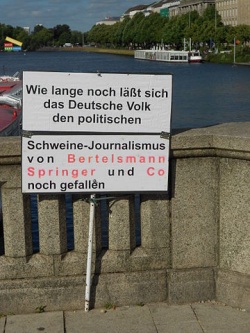Difference between revisions of "Monday Demonstrations"
(Now English WP link) |
m (Text replacement - "|wikipedia=http://en.wikipedia.org" to "|wikipedia=https://en.wikipedia.org") |
||
| Line 1: | Line 1: | ||
{{Concept | {{Concept | ||
| − | |wikipedia= | + | |wikipedia=https://en.wikipedia.org/wiki/Vigils_for_Peace |
|description = | |description = | ||
|glossary = | |glossary = | ||
Latest revision as of 05:33, 5 July 2015
 "how long will the German people put up with the pork-journalism of Bertelsmann, Springer and Co" protest sign, Hamburg, 23. June 2014 | |
| Type | Social Movement |
| Start | 17th March 2014 |
| Founder(s) | Lars Mährholz, Ken Jepsen, Pedram Shahyar |
Monday Demonstrations (Europe)
alt. names: Occupy Peace, Mahnwache für den Frieden (Ger.,lit. "picket for peace")
Since 17. March 2014 people from all social stratums meet in over 150 Cities (as of Oct. 2014) in Europe in public places every monday denouncing the commercially-controlled media as unreliable and referring to the financial system as a major source of wars. Although there are similarities to Occupy Wallsteet, initiator Lars Mährholz also points out differences in an interview by Max Keiser for Russia Today.
A list of cities and speeches is available at http://montagsdemo.eu/.
The term "Monday Demonstrations" refers back to the uprisings in 1989 in East Germany.
Reaction
Since the commercially-controlled media is in the center of criticism, they first ignored the movement, then started a counter attack following a common pattern: the movement is portrayed as right-wing, anti-semite, autoritarian and conspiracy-theorists. It then goes on to lunch a series of ad hominem attacks on popular speakers avoiding discussion of the speech's contents. The campaign includes internet media such as youtube, facebook and television channels, echoing this same rethoric pattern.
Study
A non-representative questioning of participants was conducted by the Technical University Berlin in cooperation with a private NGO called "Verein für Protest- und Bewegungsforschung e.V" and published on the NGO's webpage.[1] In its final assessment the authors find a mixed bag of opinions but go into each of the diverging arguments separately so that it becomes easy to quote their work out of context by omitting the balancing statements.
The WP page is closely monitored to reflect the stance of the commercially-controlled media making use of the study by omission. Edits citing balancing statements of the study are reverted within minutes.